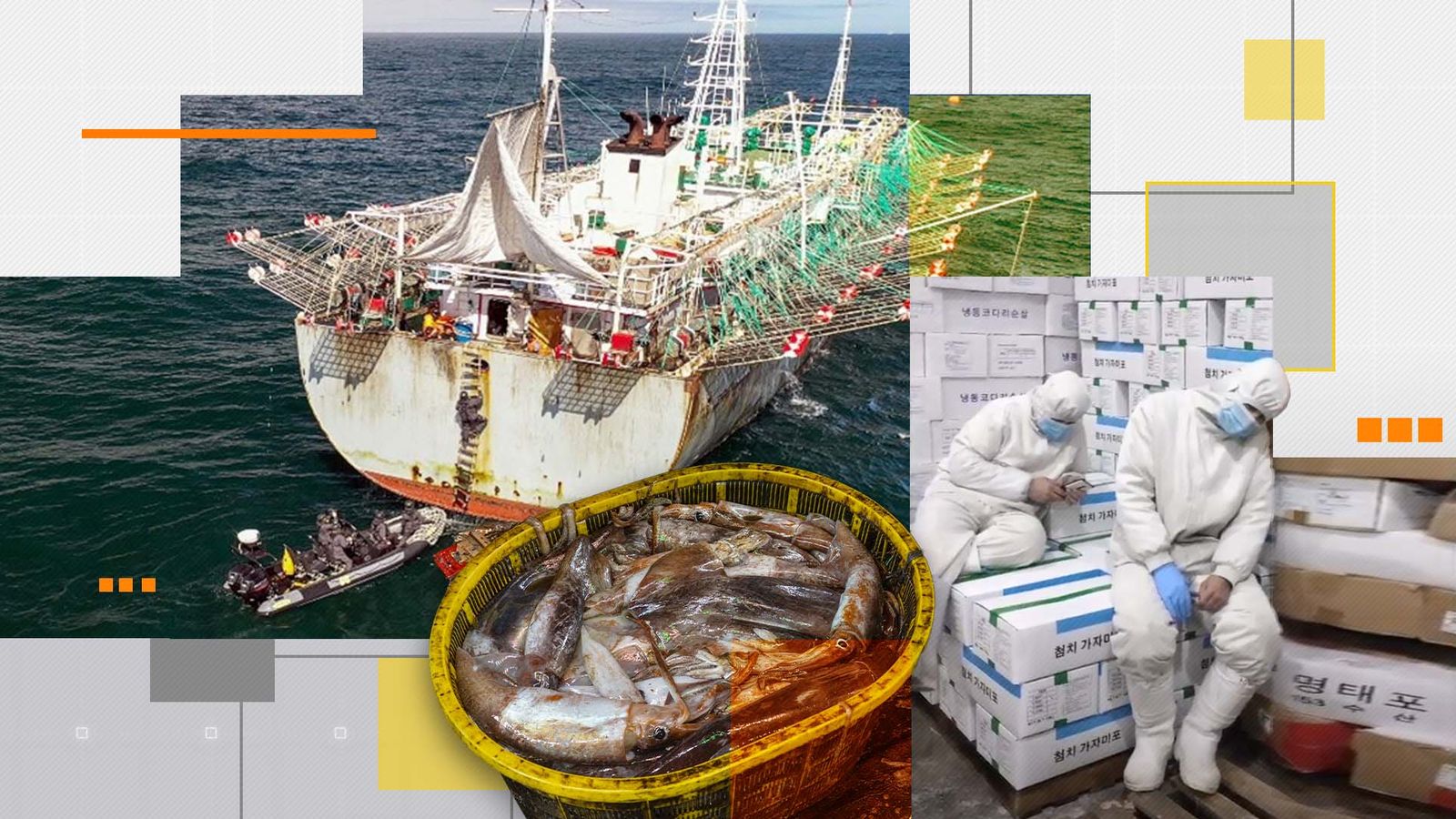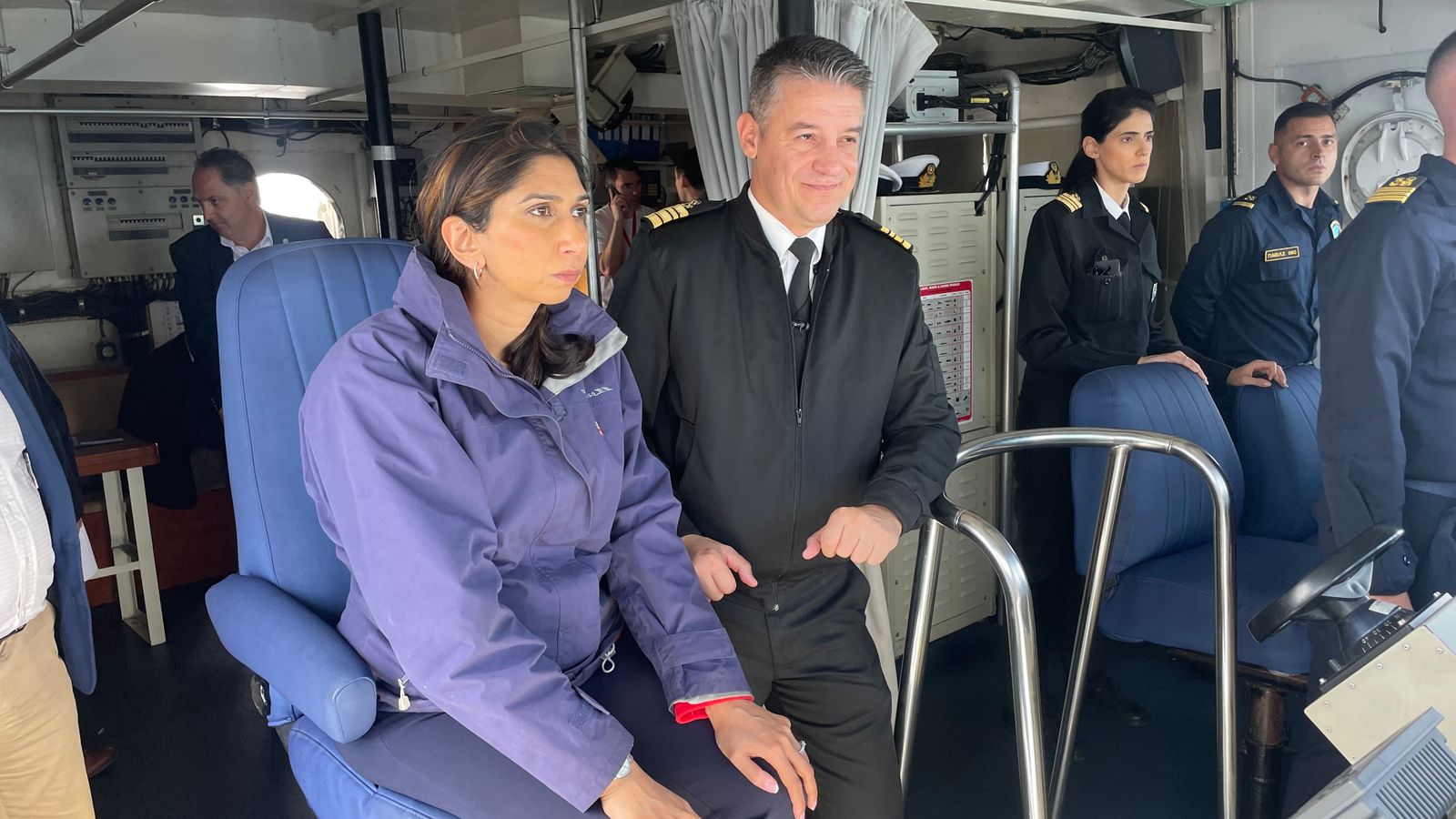Seafood allegedly produced using the forced labour of Uyghur people in China may have been sold at Iceland – and could be on sale now at other British supermarkets, according to an investigation.
Iceland told Sky News it no longer had a relationship with the Chinese supplier in question.
Since 2018, the Chinese government is believed to have moved tens of thousands of Uyghurs from their homes in Xinjiang to other parts of China, as part of a “labour transfer programme”.
Human rights advocates say the programme constitutes forced labour, a charge that China has repeatedly denied. The Chinese embassy did not respond to our request for a comment.
An investigation by non-profit journalism organisation The Outlaw Ocean Project – shared with Sky News – has found that nine large seafood companies in Shandong, a province in east China, have received at least 2,000 Uyghurs and other Muslim minorities from Xinjiang – and that many of them supply the UK.
One of those is Shandong Meijia Group, one of the largest seafood processing companies in China.
In 2021, Sky News visited one of the company’s factories in the town of Rizhao, as part of an investigation that revealed details of Uyghur forced labour.
Tsingtao says worker filmed urinating into malt container at beer factory has been detained
Li Keqiang: China’s former deputy leader suffers fatal heart attack
China sends youngest ever crew into space as it aims for 2030 moon mission
The company had posted an article on its website showing Uyghurs arriving as part of the “integration of the national family”.
After Sky News sent questions to the company, the article was deleted. A manager at the entrance told our reporting team that there were no Uyghur workers.
But videos posted to Douyin – the Chinese counterpart of TikTok – have been uncovered by Outlaw Ocean and verified by Sky News.
They show Uyghur workers as recently as October 2022, and at another factory as recently as May 2023, at two Meijia Group plants: Meijia Jiayuan and Meijia Keyuan.
Shandong Meijia did not respond to Sky News’s request for comment.
The Outlaw Ocean Project reviewed hundreds of pages of internal company newsletters, local news reports, a database of Uyghur testimonies, trade data, and satellite and cell phone imagery to verify the location of processing plants.
They also verified that the Douyin users had initially registered in Xinjiang.
This investigation was produced by The Outlaw Ocean Project, which focuses on human rights and environmental crimes at sea around the world.
Based on over four years of reporting at sea and on land, including on the high seas near North Korea, West Africa, the Galapagos, and the Falkland islands, the investigation was conducted in collaboration with the New Yorker, and derives from reporting and writing from Ian Urbina, Maya Martin, Sue Ryan, Joe Galvin, Daniel Murphy, Jake Conley and Austin Brush.
To chronicle working conditions on Chinese fishing ships, the reporting team boarded vessels at sea and interviewed crew.
When permitted, they boarded vessels to talk to crew, or came alongside them to interview officers by radio.
In many instances, the Chinese ships got spooked, pulling up their gear and fleeing.
When this happened, the team trailed the ships in a small boat to get close enough to throw aboard plastic bottles weighed down with rice, and containing a pen, cigarettes, hard sweets, and interview questions.
On several occasions, deckhands wrote replies, providing phone numbers for family back home, and then threw the bottles back into the water.
The reporting included interviews with their family members, and with two dozen additional crew members.
Iceland hasn’t received products for ‘significant period’
Meijia’s customers include Iceland, and distributors Fastnet Fish and Westbridge Foods Ltd, according to an archived version of their customer list on their website.
Fastnet Fish has said that as a result of the investigation it had terminated its relationship with Meijia. Westbridge Foods did respond to Sky News’s request for comment.
Iceland appeared to admit that Meijia had, at one point, been a supplier – but a spokesperson told Sky News: “We can confirm that Iceland is not, nor has not for a significant period, received any products from such sites.
“It is Iceland’s policy to be able to act responsibly in all commercial and trading activities to establish that the working conditions of people working for, and within the supply chain, meet relevant international standards.”
Asked by Sky News, the supermarket did not explain when or why it stopped receiving products.
It also said it was working with international auditing organisations, such as the Ethical Trading Initiative and Sedex, on the issue of relocation of Uyghurs in China.
Sainsbury’s ‘working to understand situation’
Uyghur workers were also deployed to other seafood factories run by the Chishan group, a Chinese conglomerate, according to The Outlaw Ocean Project’s research.
The company supplies Lyons Seafoods, which produces branded and private-label seafood for retailers including Sainsbury’s.
Lyons did not respond to Sky News’s request for comment – but its French parent company Labeyrie had previously told the Outlaw Ocean Project that they were “extremely concerned” by the allegations.
A Sainsbury’s spokesperson told Sky News: “All of our suppliers have to meet our high ethical and worker welfare standards.
“If we have any reason to believe there is a situation within our supply chains which is in breach of those standards we take immediate action.
“We are working together with our suppliers and wider industry partners to understand the situation and take the most responsible and appropriate next steps.”
Fish shipments bound for Europe usually pass through Rotterdam – where sometimes they are repackaged in different containers – which can add to the difficulty in tracking shipments.
From there, the seafood shipments arrive at UK ports, such as Felixstowe.
‘Human trafficking, wage theft and criminal level of neglect’
As part of a four-year-long investigation, the Outlaw Ocean Project may have revealed other abuses connected to China’s vast fishing fleet – including the story of Daniel Daniel Aritonang, a 20-year-old Indonesian who died from the disease Beriberi after suffering abuse on a Chinese vessel.
Ian Urbina, the director of the Outlaw Ocean Project, told Sky News: “The human rights and labour crimes – you’re dealing with human trafficking, you’re dealing with death by violence, wage theft, blocking of timely access to medical care, criminal level of neglect in the form of Beriberi, people that are essentially deprived of the key nutrients to be able to survive.
“Vessels that go dark and turn off their transponders and they disappear – all these are well documented crimes as well that are in the marine space.”
The group that owned the vessel, Rongcheng Wangda, has denied any wrongdoing and has referred the matter to the China Overseas Fisheries Association for investigation. No criminal case been brought.
“The reality is that because it’s out of sight, out of mind, you know, a lot of that is happening over the horizon, quite literally,” David Hammond, chief executive of the NGO Human Rights at Sea, told Sky News.
“Nobody knows what’s going on. So you then have the issue of enforcement and there is a massive lacuna in the enforcement issue from coastal states and international waters.
“And without enforcement, you don’t have a deterrent effect and without deterrent effect, you have impunity.”
The Data and Forensics team is a multi-skilled unit dedicated to providing transparent journalism from Sky News. We gather, analyse and visualise data to tell data-driven stories. We combine traditional reporting skills with advanced analysis of satellite images, social media and other open source information. Through multimedia storytelling we aim to better explain the world while also showing how our journalism is done.










